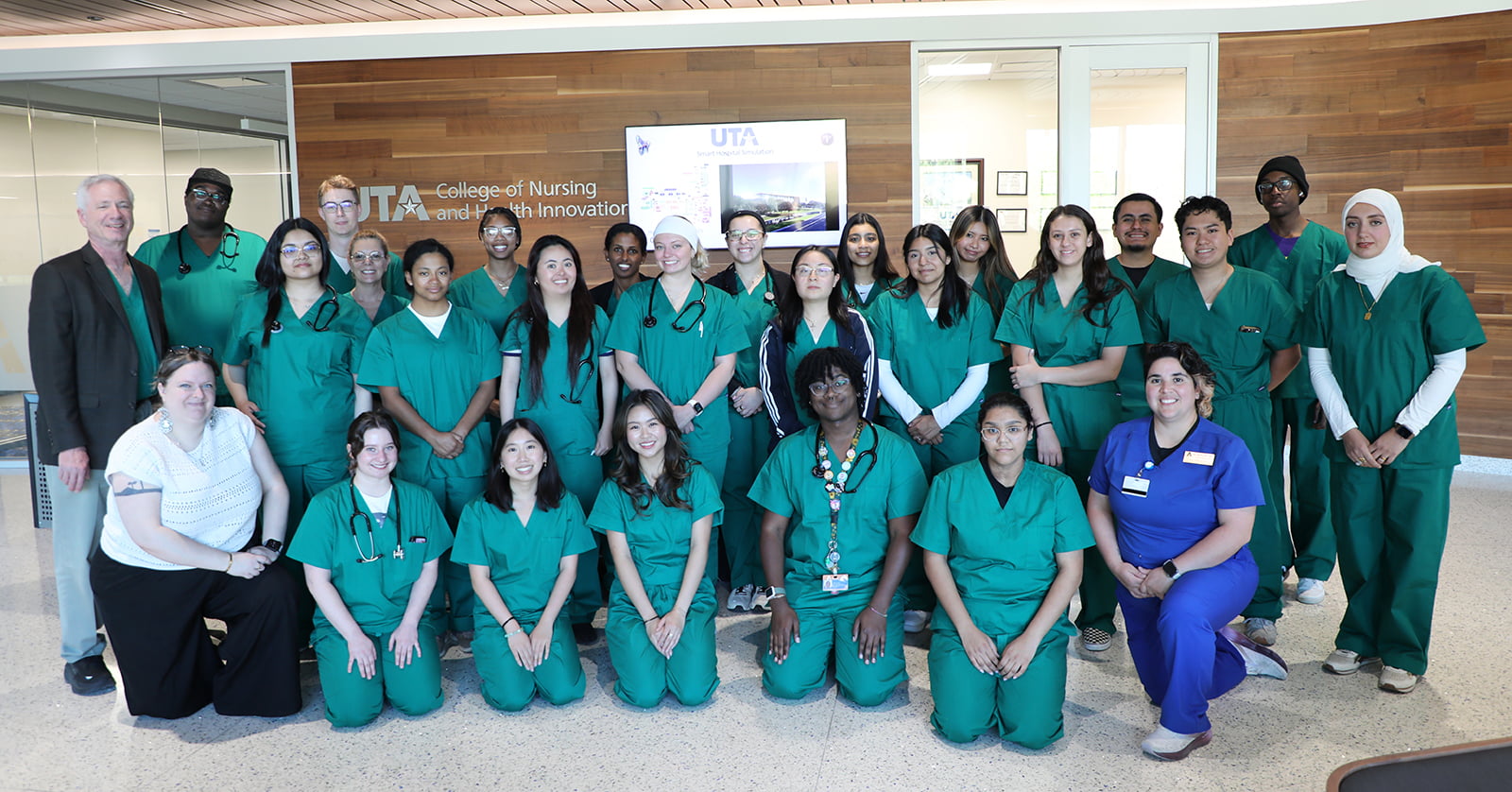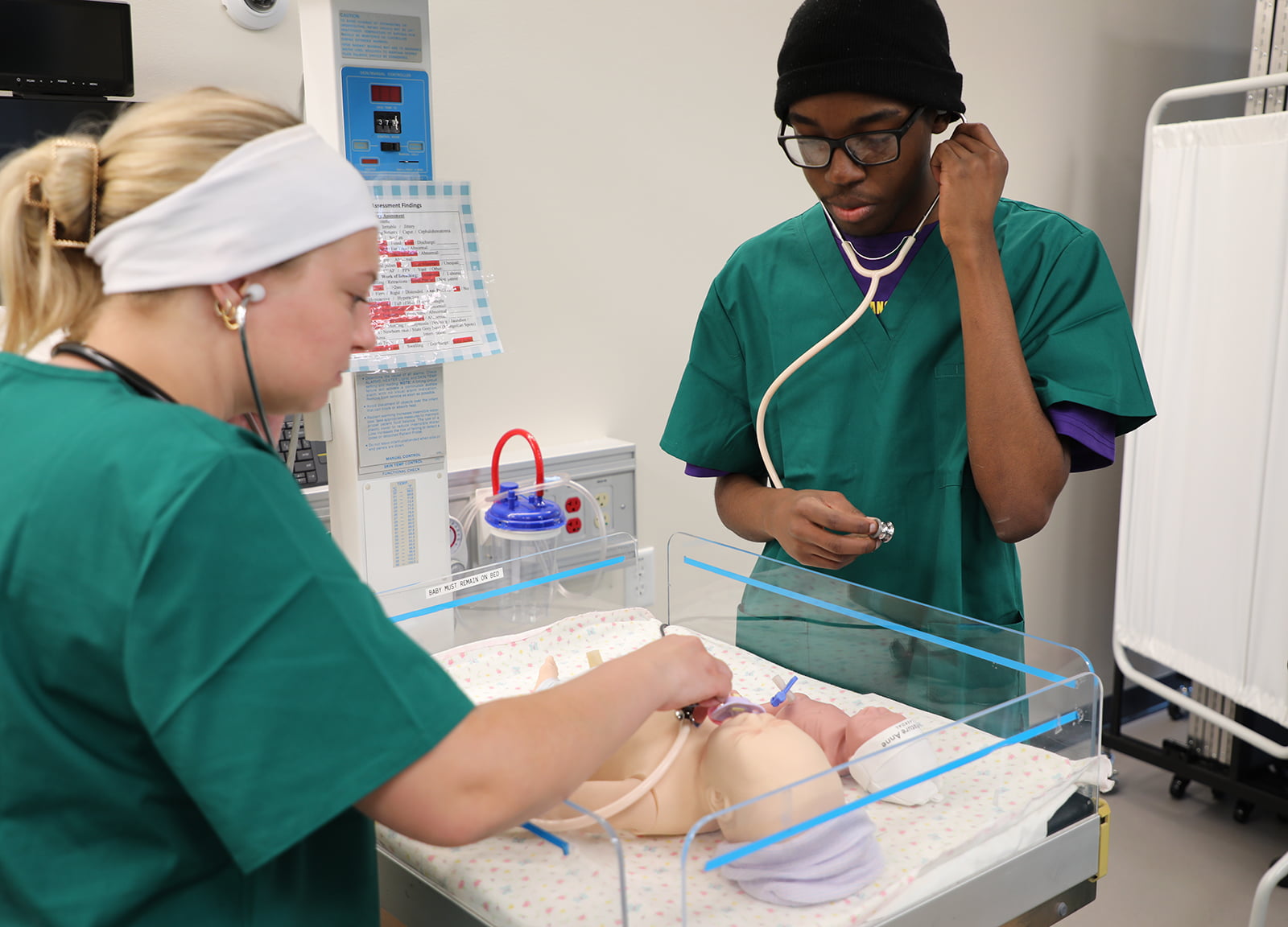Life Sciences Building, Room 206
501 S. Nedderman Drive
Box 19047
Arlington, TX 76019
Simulation lab provides hands-on learning experience for students

A new collaboration is providing valuable hands-on learning experience for pre-health students in a College of Science course at The University of Texas at Arlington.
Students in the course, SCIE 4304: The Art of Diagnosing Disease in Humans, are taking part in an immersive simulation lab in clinical medicine in the UTA Smart Hospital. The Simulation Lab is the result of joint efforts from the College of Science, College of Nursing and Health Innovations, and UTA Libraries.
Steve Gellman, M.D., associate professor of practice, teaches the course and said to his knowledge it is the first time a lab in clinical medicine has been included as part of a College of Science pre-med course. He said there are two goals for the Simulation Lab experience.
“One goal is to teach students rudimentary clinical skills, and the other is to allow students to overcome the ‘imposter syndrome’ by building their self-confidence in clinical medicine,” Gellman said. “The second is equally as important as the first, because that imposter syndrome holds a lot of medical students back. By giving them hands-on experience, it lets them see that they can do it and boosts their confidence.”
The course examines a variety of diagnostic tools used to screen, diagnose, and monitor a wide variety of health and disease states, Gellman said. The Simulation Lab includes basic clinical skills training such as checking vital signs, EKG readings, and moulage evaluations. Moulage is the art of applying simulated skin lesions or injuries to manikins for the purpose of training healthcare personnel. The lab sessions also include practicing communication skills using both manikins and live standardized patients.

“Through simulation, learners are able to experience taking vital signs, specimen exam, suture, obtain patient history, physical exam, and interaction with standardized patients, which are paid actors or actresses in our program,” said Erica Hinojosa, simulation technology manager. “These hands-on educational experiences allow learners to understand the healthcare profession a little more, give them the experience of being a physician, and provide preparation for the workforce.”
Gellman first approached the Smart Hospital about the idea of a simulation lab for his SCIE 4304 class in 2019, when the Smart Hospital was in its previous location on the west side of campus. Extensive planning for the move to the new Social Work and Smart Hospital Building necessitated a pause in curriculum changes until last year. Jennifer Roye, assistant dean for simulation and technology and clinical assistant professor, served a key role in coordinating efforts between the College of Science and the College of Nursing and Health Innovation.
In Fall 2024, Gellman, Hinojosa, Roye, and other Smart Hospital staff worked with UTA Libraries to apply for and obtain grants from the Center for Research on Teaching and Learning Excellence (CRTLE), library, and the College of Science to integrate simulation into Gellman’s SCIE 4304 course.
Chloé Bennett, an experiential learning librarian with UTA Libraries, helped extensively with the curriculum development.
“My role since then has been expertise in experiential curriculum design, lesson planning, and execution of the lessons,” Bennett said.
In May 2024, Gellman worked with the Smart Hospital to create UTA’s first pre-healthcare professional bootcamp, a sort of dry run for the current simulation lab. The intensive 10-day Clinical Experience Workshop offered students the chance to learn skills such as starting an IV line and delivering a baby, and participate in virtual reality exercises, utilizing the Smart Hospital’s state-of-the-art technology.
--
The UTA College of Science, a Carnegie R1 research institution, is preparing the next generation of leaders in science through innovative education and hands-on research and offers programs in Biology, Chemistry & Biochemistry, Data Science, Earth & Environmental Sciences, Health Professions, Mathematics, Physics and Psychology. To support educational and research efforts visit the giving page, or if you're a prospective student interested in beginning your #MaverickScience journey visit our future students page.